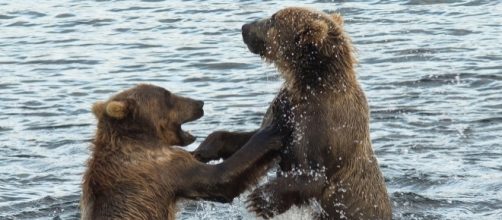Famous for catching salmon swimming upstream during the spawning season, Alaskan bears are adopting a strange eating habit that is thought to be due to climate change.
A team of researchers, working in close collaboration with multiple institutions in the United States, have observed that the warming climate in Alaska is forcing these brown bears to switch to elderberries instead of salmon which is their natural prey. The study was recently published in Proceedings of the National Academy of Sciences.
To conduct this research, time-lapse cameras were used to capture bears feeding.
GPS collars were placed on 36 females for tracking, and aerial surveys were also conducted. Bear droppings were also examined. As the berries are ripening earlier, the brown Kodiak bears are facing a dilemma whether to eat salmon or elderberries.
Overlapping of seasons in Alaska
Salmon spawning occurred around the end of July while elderberries usually ripened by the end of August. Bears would start by feeding on the spawning salmon and would start eating elderberries one month later until September. They typically killed 25 to 75 percent of the salmon. However, the early ripening of berries is overlapping with the spawning season. The Kodiak bears have been observed to abandon the rivers and salmon, and feed exclusively on the berries in spite of the fact that salmons are not in short supply.
Kodiak may not grow up healthy
This reshuffling of seasonal timings and the change in the feeding habits of the bears are also disrupting a vital ecological link. Feasting on the berries early in the year could undeniably deprive the bears of nutritious food.
Preying on the annual salmon run influences not only the salmon population but also the demographic rates of bears. Feeding more on elderberries that are less dense in energy compared to the protein-rich salmon could prevent the Alaskan bears - the largest bears in the world - from growing up healthy. Their population is presently estimated at 3,500 on the Kodiak Archipelago. However, hunters are legally allowed to kill about 180 Kodiak bears annually.
Furthermore, by feeding on Salmon, the bears disperse marine-derived nutrients into terrestrial food webs. This change in eating habits could deprive other animals from feeding on the leftovers. The researchers are also concerned about how this prey-switching could affect the stability of food webs in the long-term.


